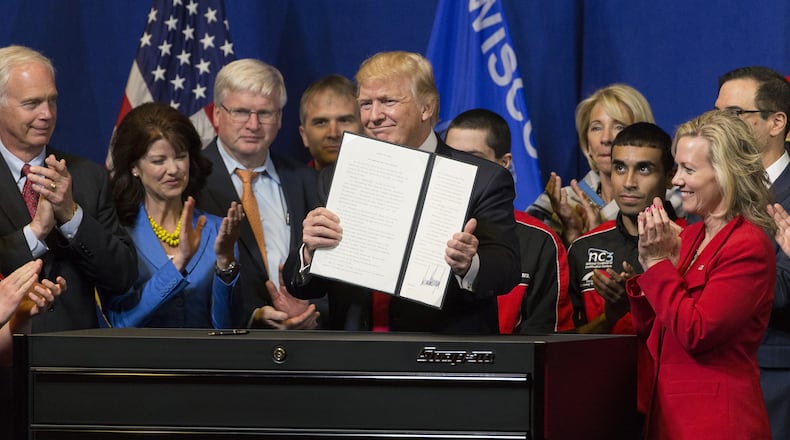During his State-of-the-Union address last week, Trump drew a hard line against free-trade when he proclaimed the United States has “finally turned the page on decades of unfair trade deals that sacrificed our prosperity and shipped away our companies, our jobs, and our nation’s wealth.” He added defiantly: “The era of economic surrender is over.”
But even as Trump’s tough rhetoric resonates with scores of Americans, a wide array of economists and U.S. business executives fear ending NAFTA would spark a trade war with Canada and Mexico. Such a war, they say, would hamper agricultural exports by Ohio farmers, increase prices for Americans, and wreak havoc on an integrated automotive supply chain that is vital to job producers like Honda.
Some even point to the harsh lessons of the 1930s, when the United States imposed steep tariffs on imported goods that led to a trade war and contributed to the Great Depression.
“If (NAFTA) were to be terminated, it would be a disaster for Ohio,” said Edward Hill, a professor of economics at Ohio State University.
Douglas Irwin, a professor of economics at Dartmouth College, added: “It would be less likely we would see a crash. But we would see the U.S. displaced in world markets and falling behind.”
‘Disruptive to say the least’
Critics of NAFTA and other free-trade agreements, such as Robert Scott, a senior economist at the left-leaning Economic Policy Institute in Washington, D.C., acknowledge withdrawing from the pact would “be disruptive to say the least.”
“It’s not going to be the end of the world by any means,” Scott said. “There would be tariffs and it would slow down trade. If we go down that path, it would be somewhat costly for the domestic economy and more costly for Mexico and Canada.”
But, said Scott, “The NAFTA horse is out of the barn and you can’t reverse that damage just by withdrawing from the deal.”
‘Ohio is a trade state’
NAFTA wiped out scores of tariffs throughout North America, making it less expensive for U.S. companies and farmers to export their goods. Honda and other automotive companies created a sophisticated supply chain in all three countries as trade mushroomed from $290 billion in 1993 to $1.1 trillion in 2016.
Ohio’s exports have doubled since 2000 and the pact cemented Canada and Mexico as the state’s two largest trading partners. Ohio’s exports of soybeans to all countries, which were negligible in 2000, blossomed to $2 billion in 2016.
“Ohio is a trade state,” Hill said. “Our auto industry is dependent on supply chains that go into Mexico and Canada.”
Manufacturing job loss
While exports have climbed upward, manufacturing jobs went in the other direction, and many pointed the finger at the trade deal hatched during the Clinton administration. Scott calculates NAFTA eliminated 700,000 manufacturing jobs in the United States.
Ohio went from having about 1 million manufacturing jobs in 2000 to roughly 700,000 today.
“NAFTA was a really bad piece of legislation that shifted the playing field in favor of investors and against working people,” said Scott, who said the pact ushered in a wave of free-trade agreements that accelerated the loss of manufacturing jobs in the United States.
Yet to what degree NAFTA is responsible for those job losses is debatable. Even after the trade deal went into effect in 1994, Ohio’s manufacturing jobs held steady at 1 million.
NAFTA may be a factor in the loss of jobs, but the recessions of 2001 and 2008 — combined with intense competition from China and improved productivity — probably played a bigger role. Since the depths of the 2009 recession, the state has added roughly 100,000 manufacturing jobs.
“Trade is very visible and easy to be blamed, but technology has a lot more to do with manufacturing job loss than trade agreements,” said Irwin, author of the book, “Clashing over Commerce: A History of U.S. Trade Policy.”
Unpredictable future
For now, the Trump administration is adopting a rigid posture in Montreal, and getting a cool reception from its trade partners. Mexico and Canada have flatly rejected the American demand that 50 percent of the content of new cars and trucks come from the United States.
In a letter last week to Trump, Sen. Rob Portman, R-Ohio and 35 other Senate Republicans wrote that a “wide range of industries in the U.S. have benefited from this agreement and American consumers are reaping those benefits, too.”
They pointedly noted that “the next step to advance the economy requires that we keep NAFTA in place, but modernize it to better reflect our 21st century economy.”
Hill is among the many who say the future of NAFTA is hard to predict.
“I cannot comment on the probability of its termination because all my predictions dealing with the Trump administration have been completely inaccurate,” he said.
About the Author
